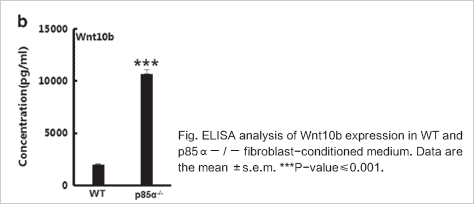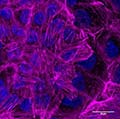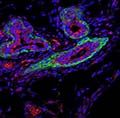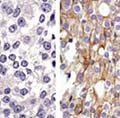CUSABIO는 암, 세포 생물학, 면역학, 신경과학, 후생유전학 등 연구 분야의 글로벌 고객에게 60,000개 이상의 검증된 항체,
10,000개 이상의 재조합 단백질, 660개 이상의 사이토카인 및 수천 개의 ELISA 키트를 제공하는 검증된 제조업체 입니다.

유방암은 전 세계 여성들 사이에서 암으로 인한 사망의 주요 원인입니다. 대부분의 유방암은 유선의 유즙 형성 관을 둘러싼 세포에서 발생하는 암으로, 이를 유암종이라고 합니다.
유방암의 증상으로는 유방에 덩어리가 생기거나, 유방 모양의 변화, 피부의 울퉁불퉁한 변화, 유두에서 분비물이 나오거나, 붉고 비늘 모양의 피부가 생기는 등의 증상이 있을 수 있습니다. 유방암 발병의 위험 요소로는 여성, 비만, 신체 활동 부족, 알콜 섭취, 폐경기 호르몬 대체 요법, 이온화 방사선, 첫 월경 나이가 어릴수록, 늦거나 전혀 자녀를 가지지 않거나, 나이가 많은 경우, 가족력이 있습니다. 전체 유방암 환자의 약 5–10%는 부모로부터 유전된 유전자, 예를 들어 BRCA1과 BRCA2 등과 관련이 있습니다.
위의 map에서 보여주듯, 우리는 유방암 경로를 요약하여 유방암 연구를 지원하고, 원인 규명과 예방, 진단, 치료 및 치료 전략 개발에 도움을 주고자 합니다. Cusabio는 ELISA 키트 개발을 위한 견고한 플랫폼과 성숙한 항원-항체 연구 개발 시스템을 보유하고 있습니다. 현재 Cusabio는 유방암 연구를 위한 높은 특이성, 높은 민감도, 높은 안정성을 갖춘 178개의 ELISA 키트를 다양한 종에 대해 제공하고 있습니다. 우리의 일부 제품은 HER2, HES1, WNT10B 등과 같은 연구 결과에 인용되었습니다. 또한 유방암 연구를 위한 다른 제품들인 유전자, 단백질 및 항체도 보유하고 있습니다. ELISA 키트 전체 카탈로그를 보시려면 여기를 방문하세요.
| Product Name | Code | Sample Type | Detect Range | Sensitivity |
|---|---|---|---|---|
| Human AKT1 ELISA Kit | CSB-EL001553HU | serum, plasma, cell lysates | 0.312 ng/ml-20 ng/ml | 0.078 ng/ml |
| Human APC ELISA Kit | CSB-E09909h | serum, plasma, tissue homogenates | 1.56 pg/ml-100 pg/ml | 0.39 pg/ml |
| Mouse APC ELISA Kit | CSB-E09914m | serum, plasma and tissue homogenates | 62.5 pg/ml-4000 pg/ml | 15.6 pg/ml |
| Human BRAF ELISA Kit | CSB-EL002791HU | serum, plasma, cell lysates | 31.25 pg/ml-2000 pg/ml | 7.8pg/ml |
| Human CDK4 ELISA Kit | CSB-E09174h | serum, plasma | 0.156 ng/ml-10 ng/ml | 0.039 ng/ml |
| Human CTNNB1 ELISA Kit | CSB-E08963h | serum, plasma, cell culture supernates, tissue homogenates and cell lysates | 15.6 pg/ml-1000 pg/ml | 3.9 pg/ml |
| Mouse CTNNB1 ELISA Kit | CSB-E11307m | serum, plasma, tissue homogenates, cell lysates | 0.156 ng/ml-10 ng/ml | 0.039 ng/ml |
| Human DLL1 ELISA Kit | CSB-EL006947HU | serum, plasma, tissue homogenates | 18.75 pg/ml-1200 pg/ml | 4.68 pg/ml |
| Human DLL3 ELISA Kit | CSB-EL006948HU | serum, plasma, tissue homogenates | 18.75 pg/ml-1200 pg/ml | 4.68pg/ml |
| Human DLL4 ELISA Kit | CSB-EL006949HU | serum, plasma, tissue homogenates | 23.5 pg/ml-1500 pg/ml | 5.8 pg/ml |
| Mouse DLL4 ELISA Kit | CSB-EL006949MO | serum, plasma, tissue homogenates | 10 ng/ml-0.16 ng/ml | 0.04 ng/ml |
| Human EGF ELISA Kit | CSB-E08027h | serum, plasma, cell culture supernates, tissue homogenates | 1.56 pg/ml-100 pg/ml | 0.39 pg/ml |
| Mouse EGF ELISA Kit | CSB-E08028m | serum, plasma, tissue homogenates | 7.8 pg/ml-500pg/ml | 1.95 pg/ml |
| Rat EGF ELISA Kit | CSB-E08029r | serum, plasma, tissue homogenates | 3.12 pg/ml-200 pg/ml | 0.78 pg/ml |
| Human EGFR ELISA Kit | CSB-E12124h | serum, plasma, tissue homogenates | 0.312 ng/ml-20 ng/ml | 0.019 ng/ml |
| Human ERBB2 ELISA Kit | CSB-E11161h | serum, plasma, tissue homogenates, cell lysates | 0.156 ng/ml-10 ng/ml | 0.04 ng/ml |
| Human ESR1 ELISA Kit | CSB-E08652h | serum, plasma, tissue homogenates, cell lysates | 3.12 pg/ml-200 pg/ml | 0.78 pg/ml |
| Rat ESR1 ELISA Kit | CSB-E06848r | serum, plasma, tissue homogenates, cell lysates | 31.25 pg/ml-2000 pg/ml | 7.81 pg/ml |
| Human FGF1 ELISA Kit | CSB-E04546h | serum, plasma, tissue homogenates | 15.6 pg/ml-1000 pg/ml | 3.9 pg/ml. |
| Mouse FGF1 ELISA Kit | CSB-E07327m | serum, plasma, tissue homogenates | 6.25 pg/ml-400 pg/ml | 1.56 pg/ml |
| Human FGF10 ELISA Kit | CSB-E14965h | serum, plasma and tissue homogenates | 3.12 pg/ml-200 pg/ml | 0.78pg/ml |
| Mouse FGF10 ELISA Kit | CSB-E13045m | serum, plasma, cell culture supernates, tissue homogenates | 1.56 pg/ml-100 pg/ml | 0.39 pg/ml |
| Human FGF13 ELISA Kit | CSB-E13849h | serum, plasma, cell culture supernates | 12.5 pg/ml-800 pg/ml | 3.12 pg/ml |
| Human FGF17 ELISA Kit | CSB-EL008622HU | serum, plasma, cell culture supernates and tissue homogenates | 3.12 pg/ml -200 pg/ml | 0.78 pg/ml |
| Human FGF18 ELISA Kit | CSB-EL008623HU | serum, plasma, cell culture supernates and tissue homogenates | 31.25 pg/ml-2000 pg/ml | 7.81 pg/ml |
| Human FGF19 ELISA Kit | CSB-EL008624HU | 0 | Request Information | Request Information |
| Human FGF2 ELISA Kit | CSB-E08000h | serum, plasma, cell culture supernates, tissue homogenates | 1.56 pg/ml-100 pg/ml | 0.39 pg/ml |
| Mouse FGF2 ELISA Kit | CSB-E08001m | serum, plasma, cell culture supernates, tissue homogenates | 3.12 pg/ml-200 pg/ml | 0.78 pg/ml |
| Rat FGF2 ELISA Kit | CSB-E08002r | serum, plasma, tissue homogenates | 0.9 pg/ml-60 pg/ml | 0.22 pg/ml |
| Human FGF20 ELISA Kit | CSB-EL008626HU | serum, plasma, tissue homogenates, cell lysates | 12.5 pg/ml-800 pg/ml | 3.12 pg/ml |
| Rat FGF20 ELISA Kit | CSB-EL008626RA | serum, plasma, tissue homogenates | 1000 pg/ml-15.63 pg/ml | 3.91 pg/ml |
| Human FGF21 ELISA Kit | CSB-E16844h | serum, plasma, cell culture supernates, tissue homogenates | 15.6 pg/ml-1000 pg/ml | 3.9 pg/ml |
| Mouse FGF21 ELISA Kit | CSB-EL008627MO | serum, plasma, tissue homogenates, cell lysates | 31.25 pg/ml-2000 pg/ml | 7.8 pg/ml |
| Rat FGF21 ELISA Kit | CSB-EL008627RA | serum, plasma, tissue homogenates | 23.5 pg/ml-1500 pg/ml | 5.8pg/ml |
| Human FGF23 ELISA Kit | CSB-E10113h | serum, cell culture supernates, urine, tissue homogenates | 3.12 pg/ml-200 pg/ml | 0.78 pg/ml |
| Mouse FGF23 ELISA Kit | CSB-EL008629MO | serum, plasma, tissue homogenates | 23.44 pg/ml-1500 pg/ml | 5.86 pg/ml |
| Rat FGF23 ELISA Kit | CSB-E12170r | serum, plasma, cell culture supernates and tissue homogenates | 1.56 pg/ml-100 pg/ml | 0.39pg/ml |
| Human FGF4 ELISA Kit | CSB-E04548h | serum, plasma | 6.25 pg/ml-400 pg/ml | 1.56pg/ml |
| Human FGF5 ELISA Kit | CSB-EL008632HU | serum, plasma, tissue homogenates | 15.6 pg/ml-1000 pg/ml | 3.9pg/ml |
| Mouse FGF5 ELISA Kit | CSB-EL008632MO | serum, plasma, tissue homogenates | 31.25 pg/ml-2000 pg/ml | 7.8 pg/ml |
| Human FGF6 ELISA Kit | CSB-E04549h | serum, plasma, tissue homogenates | 500 pg/ml-7.81 pg/ml | 1.95 pg/ml |
| Human FGF7 ELISA Kit | CSB-E08939h | serum, plasma, tissue homogenates | 31.25 pg/ml -2000 pg/ml | 7.8 pg/ml |
| Mouse FGF7 ELISA Kit | CSB-E13046m | serum, plasma, cell culture supernates and tissue homogenates | 1.56 pg/ml-100 pg/ml | 0.39 pg/ml |
| Rat FGF7 ELISA Kit | CSB-E12905r | serum, plasma | 31.25 pg/ml-2000 pg/ml | 7.81 pg/ml |
| Human FGF8 ELISA Kit | CSB-E15861h | serum, plasma, tissue homogenates, cell lysates | 15.6 pg/ml-1000 pg/ml | 3.9 pg/ml |
| Human FGF9 ELISA Kit | CSB-E04550h | serum, plasma, cell culture supernates and tissue homogenates | 6.25 pg/ml-400 pg/ml | 1.56 pg/ml |
| Human FLT4 ELISA Kit | CSB-E04765h | serum, plasma, tissue homogenates | 0.156 ng/ml-10 ng/ml | 0.039 ng/ml |
| Mouse FLT4 ELISA Kit | CSB-E04766m | serum, plasma, tissue homogenates | 9.38 pg/ml-600 pg/ml | 2.34 pg/ml |
| Human IGF1 ELISA Kit | CSB-E04580h | serum, plasma and tissue homogenates | 7.8 ng/ml-500 ng/ml | 1.95 ng/ml |
| Mouse IGF1 ELISA Kit | CSB-E04581m | serum, plasma, tissue homogenates | 0.156 ng/ml-10 ng/ml | 0.151 ng/ml |
| Rat IGF1 ELISA Kit | CSB-E04582r | serum, plasma, cell culture supernates and tissue homogenates | 0.156 ng/ml-10 ng/ml | 0.151 ng/ml |
| Human IGF1R ELISA Kit | CSB-E13766h | serum, plasma, tissue homogenates | 0.312 ng/ml-20 ng/ml | 0.078 ng/ml |
| Rat IGF1R ELISA Kit | CSB-E13873r | serum, plasma, tissue homogenates | 3.12 pg/ml-200 pg/ml | 0.78 pg/ml. |
| Human JAG1 ELISA Kit | CSB-EL011927HU | serum, plasma, tissue homogenates | 0.156 ng/ml-10 ng/ml | 0.039 ng/ml |
| Human KRAS ELISA Kit | CSB-EL012493HU | serum, plasma, tissue homogenates | 23.5 pg/ml-1500 pg/ml | 5.8 pg/ml |
| Human LRP6 ELISA Kit | CSB-E08952h | serum, tissue homogenates, cell lysates | 0.312 ng/ml-20 ng/ml | 0.078 ng/ml |
| Human mTOR ELISA Kit | CSB-E09038h | serum, plasma, tissue homogenates | 1.56 pg/ml-100 pg/ml | 0.39pg/ml |
| Human MYC ELISA Kit | CSB-E09260h | serum, plasma, tissue homogenates, cell lysates | 0.312 ng/ml-20 ng/ml | 0.078ng/ml |
| Human NOTCH1 ELISA Kit | CSB-EL015949HU | serum, plasma, tissue homogenates, cell lysates | 78 pg/ml-5000 pg/ml | 19.5 pg/ml |
| Human NOTCH3 ELISA Kit | CSB-EL015952HU | serum, plasma, tissue homogenates and cell lysates | 125 pg/ml-8000 pg/ml | 31.25 pg/ml |
| Human PGR ELISA Kit | CSB-E09214h | 0 | 0.357 ng/ml-10 ng/ml | 0.14 ng/ml |
| Mouse PIK3CA ELISA Kit | CSB-E08419m | serum, plasma, tissue homogenates | 23.5 pg/ml-1500 pg/ml | 5.8 pg/ml |
| Human TNFSF11 ELISA Kit | CSB-E05125h | serum, plasma, cell culture supeernates, tissue homogenates | 7.8 pg/ml-500 pg/ml | 1.95pg/ml |
| Mouse TNFSF11 ELISA Kit | CSB-E05127m | serum, plasma, cell culture supernates, tissue homogenates | 15.6 pg/ml-1000 pg/ml | 3.9 pg/ml |
| Rat TNFSF11 ELISA Kit | CSB-E05126r | serum, plasma, cell culture supernates | 62.5 pg/ml-4000 pg/ml | 15.6 pg/ml |
| Human TP53 ELISA Kit | CSB-E08334h | serum, cell culture supernates, urine, cerebrospinal fluid (CSF), tissue homogenates, cell lysates | 9.38 pg/ml-600 pg/ml | 2.34 pg/ml |
| Rat TP53 ELISA Kit | CSB-E08336r | serum, plasma, tissue homogenates | 12.5 pg/ml-800 pg/ml | 3.12pg/ml |
| Human WNT1 ELISA Kit | CSB-EL026128HU | serum, plasma, tissue homogenates | 0.312 ng/ml-20 ng/ml | 0.078 ng/ml |
| Mouse WNT1 ELISA Kit | CSB-EL026128MO | serum, plasma, tissue homogenates | 18.75 pg/ml-1200 pg/ml | 4.68pg/ml |
| Mouse WNT10B ELISA Kit | CSB-EL026130MO | serum, plasma, tissue homogenates | 9.4 pg/ml-600 pg/ml | 2.35 pg/ml |
| Human WNT16 ELISA Kit | CSB-EL026132HU | serum, plasma and tissue homogenates | 31.25 pg/ml-2000 pg/ml | 7.81 pg/ml. |
| Mouse WNT16 ELISA Kit | CSB-EL026132MO | serum, plasma, tissue homogenates, cell lysates | 62.5 pg/ml-4000 pg/ml | 15.6 pg/ml |
| Human WNT2 ELISA Kit | CSB-EL026133HU | serum, plasma, tissue homogenates | 0.45 ng/ml-30 ng/ml | 0.11 ng/ml |
| Mouse WNT2 ELISA Kit | CSB-EL026133MO | serum, plasma, tissue homogenates | 15.6 pg/ml-1000 pg/ml | 3.9 pg/ml |
| Human WNT2B ELISA Kit | CSB-EL026134HU | serum, plasma, tissue homogenates, cell lysates | 62.5pg/ml-4000pg/ml | 15.6pg/ml |
| Human WNT3 ELISA Kit | CSB-EL026135HU | serum, plasma, tissue homogenates, cell lysates | 0.156 ng/ml-10 ng/ml | 0.039ng/ml |
| Mouse WNT3 ELISA Kit | CSB-EL026135MO | serum, plasma, tissue homogenates and cell lysates | 39.07 pg/ml-2500 pg/ml | 9.77 pg/ml |
| Human WNT3A ELISA Kit | CSB-EL026136HU | serum, plasma | 0.156 ng/ml-10 ng/ml | 0.039 ng/ml |
| Mouse WNT3A ELISA Kit | CSB-EL026136MO | serum, plasma, tissue homogenates | 23.5 pg/ml-1500 pg/ml | 5.8 pg/ml |
| Human WNT4 ELISA Kit | CSB-EL026137HU | serum, plasma and tissue homogenates | 23.5 pg/ml-1500 pg/ml | 5.8pg/ml |
| Mouse WNT4 ELISA Kit | CSB-EL026137MO | serum, plasma, tissue homogenates | 500 pg/ml-7.813 pg/ml | 1.953 pg/ml |
| Human WNT5A ELISA Kit | CSB-EL026138HU | serum, plasma, tissue homogenates | 0.156 ng/ml-10 ng/ml | 0.039 ng/ml |
| Mouse WNT5A ELISA Kit | CSB-EL026138MO | serum, plasma, cell culture supernates, tissue homogenates | 3.12 pg/ml-200 pg/ml | 0.78 pg/ml |
| Human WNT5B ELISA Kit | CSB-EL026139HU | serum, plasma, cell culture supernates, tissue homogenates | 0.156 ng/ml-10 ng/ml | 0.039 ng/ml |
| Mouse WNT7A ELISA Kit | CSB-EL026141MO | serum, plasma, tissue homogenates, cell lysates | 0.156 ng/ml-10 ng/ml | 0.039 ng/ml |
| Human WNT7B ELISA Kit | CSB-EL026142HU | serum, plasma, tissue homogenates | 0.156 ng/ml-10 ng/ml | 0.039 ng/ml |
| Mouse WNT7B ELISA Kit | CSB-EL026142MO | serum, plasma, tissue homogenates | 0.312 ng/ml-20 ng/ml | 0.078ng/ml |

Human epidermal growth factor receptor 2 (sp185/HER2) ELISA Kit(CSB-E11161h)purchased from cusabio.
VEGF, SDF-1α and HER2 serum levels were assessed by ELISA, both at baseline and during adjuvant treatment. At baseline, the VEGF and SDF-1α mean values were within the normal reference ranges, while the HER2 mean values showed an increase compared to the reference range. After AC-based therapy the VEGF level showed a significant increase (p = 0.011), while the SDF-1α and HER2 levels showed significant decreases (p = 0.001 and p = 0.004), respectively, compared to baseline values. At the end of the 12th cycle of taxane-based therapy, the VEGF level again exhibited a significant increase (p = 0.037), while the SDF-1α and HER2 levels were found to decrease again, although this decrease was significant only for SDF-1α (p= 0.003). The serum cytokine data, with their mean values (± SD) and pvalues, after AC-based and at the end of taxane-based therapy versus baseline, are summarized in Table 6. Additionally, we analyzed relationships between VEGF levels and the absolute numbers of CECs and their subsets and CEPs, but no direct correlations were detected.

Human NF-κB ELISA Kit (CSB-E12107h) and Human HES1 ELISA kit (CSB-EL010307HU) purchased from cusabio.
As shown in Figure 4, RANKL stimulation for 24 h obviously up-regulated the expressions of TGF-β1, NF-κB and Hes1 (P <0.01). Zoledronic acid and 0.08 mmol/L brucine markedly inhibited the expressions of TGF-β1, NF-κB and Hes1 compared with the RANKL-treated group (P<0.05 or P<0.01).

Human WNT10B ELISA Kit (CSB-EL026130HU) purchased from cusabio.
Wnt10b acts as a paracrine factor and has a crucial role in inducing breast cancer epithelial cell EMT and facilitating metastasis. Next, we measured the expression of Wnt family proteins involved in canonical pathways in p85α− / − fibroblasts and found that the expression of Wnt10b were significantly increased in p85α− / − fibroblasts compared with WT fibroblasts.

A study recently published in Nature Communications shows that breast cancer cells undergo a stiffening state prior to becoming malignant. The discovery, made by a research team led by Florence Janody, from Instituto Gulbenkian de Ciencia (IGC; Portugal), identifies a new signal in tumor cells that could be applicable in the design of cancer-targeting therapies.
Tavares, S., Vieira, A.F., Taubenberger, A.V. et al. Actin stress fiber organization promotes cell stiffening and proliferation of pre-invasive breast cancer cells. Nature Communications, Published online:16 May 2017, doi:10.1038/ncomms15237

Researchers from Princeton University's Department of Molecular Biology have identified a small RNA molecule that helps maintain the activity of stem cells in both healthy and cancerous breast tissue. The study, which will be published in the June issue of Nature Cell Biology, suggests that this "microRNA" promotes particularly deadly forms of breast cancer and that inhibiting the effects of this molecule could improve the efficacy of existing breast cancer therapies.
Toni Celià-Terrassa et al, Normal and cancerous mammary stem cells evade interferon-induced constraint through the miR-199a–LCOR axis, Nature Cell Biology (2017). DOI: 10.1038/ncb3533

While target therapies directed toward genetic mutations that drive a tumor's growth have significantly improved the outlook for many patients, they have not been as successful in controlling brain metastases in several types of cancer. In the case of breast cancer driven by overexpression of the HER2 gene, up to 50 percent of patients treated with targeted therapies eventually develop brain metastases, which are inevitably fatal. Now a Massachusetts General Hospital (MGH)-based research team has identified a novel mechanism behind the resistance to HER2- or PI3K-targeted therapies and a treatment strategy that may overcome this resistance.
D.P. Kodack et al., The brain microenvironment mediates resistance in luminal breast cancer to PI3K inhibition through HER3 activation. Science Translational Medicine (2017).

A City of Hope-led study found that the use of low-dose aspirin (81mg) reduces the risk of breast cancer in women who are part of the California's Teacher's Study. This study—which is the first to suggest that the reduction in risk occurs for low-dose aspirin—was proposed by City of Hope's Leslie Bernstein, Ph.D., professor and director of the Division of Biomarkers of Early Detection and Prevention, and published online in the journal, Breast Cancer Research.
Christina A. Clarke et al, Regular and low-dose aspirin, other non-steroidal anti-inflammatory medications and prospective risk of HER2-defined breast cancer: the California Teachers Study,Breast. Cancer Research (2017). DOI: 10.1186/s13058-017-0840-7
Cusabio의 다른 제품들도 함께 만나보세요!
| |
| |
| |
| |
| |
CUSABIO - Official Distributor in South Korea "Morebio" 한국 공식 대리점 "모아바이오